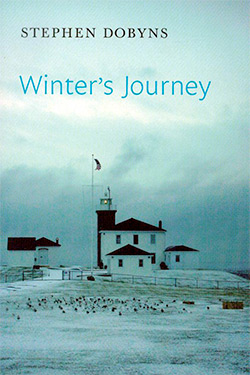Winter’s Journey
by Stephen Dobyns
reviewed by Chard deNiord
In his new collection of poems titled Winter’s Journey, Stephen Dobyns continues to haunt his reader with the same tragicomic sensibility that has characterized his poems since the early seventies. In each of his “meditative poems,” which he describes as “fretful thing[s] with dark musings coming and going / like crows weaving through the winter trees,” Dobyns ruminates about the philosophical implications of writing as a privileged American citizen. His Socratic scrutiny of such issues as American exceptionalism, irresponsible “shirking” of clarity by contemporary American poets in favor of “obscurity” and “nonmeaning,” and his own quandary about bearing witness to the injustices of his age lead the way throughout Winter’s Journey.
Two foreboding lyrics open and close the book. With ordinary, journal-like descriptions of such activities as walking his dog, examining his bent leg, staring out the window of his truck at the ocean, Dobyns switches almost imperceptibly to fascinating brown studies and psychic dramas that leave his reader pondering the ontological thews between his simplest pastimes and what he calls “getting off the subject.” This dialectic serves as an effective strategy throughout the book—a strategy Dobyns characterizes succinctly as “writing about politics and furry terrier butts.”
Dobyns is a great admirer of the seventeenth-century Japanese poet Matsuo Basho and, in particular, of Basho’s belief that the “product or purpose of the poem is not the poem’s future life, but instead, the writing itself, even if the writing seems futile at the time.” Dobyns knows that writing often leads nowhere and the difficulty of living comfortably while feeling “guilty pursuing the usual / material when the world hovers at the brink of collapse” may be no more than “dragging a dead horse up a mountain.” It’s only his “intense passion” that calls him to write, “more or less blindly” in the words of Basho.
Boom! Bang! But no harm done, really no harm done,
and when I’ve seen enough I’ll go back to a warm house
telling myself I’ve completed significant work, even if
what I mean by work is the good fortune to forget.
Dobyns observes the world with a jaundiced yet lucid eye and a keen sense of distance from his own isolation. By admitting that his “personal survival tool is the sophistry of self-deceit,” he strikes a note of fallibility, which in turn only enhances his credibility. Yet, much of what Dobyns bears witness to in Winter’s Journey is as humorous as it is tragic. And a good thing too, otherwise these engaging, discursive poems with deft enjambments would be difficult to read past the first few lines. In poems that at times seem headed toward becoming mere verbal symptoms of “a serious thinking problem,” Dobyns solves his seriousness with humor and a deft sense of when to leave off. Understandably, his meditations leave him feeling vulnerable, wishing for a thicker skin. “I’ve given my wife flowers and chocolates,” he writes in “Rhinoceros,” “and told her I loved her and now I’m telling her / that part of me, a very small part, almost a smidgeon, / wants to be a rhino hunkered down in a rhino den, / but why that should be the case, I just don’t know.”
These poems reveal the deeply moral sensibility of a poet who employs ordinary events as springboards for meditative truth-telling. His “intense passion” is odd indeed, as odd as hankering after turkey bladders. Yet, like Basho, Dobyns writes with his eye on writing and not the poem itself as “product.” Freed up to write as he thinks and to think as he writes, Dobyns follows his muse into a “dark wood” where few others are willing to travel. Like Virgil in Dante’s Inferno, he guides us boldly into nether regions we’d rather not visit on our own. We feel grateful, if also disturbed, by his guidance. Such a double feat in these poems testifies to his double gift as a poet and witness of our time.
Published on March 18, 2013

